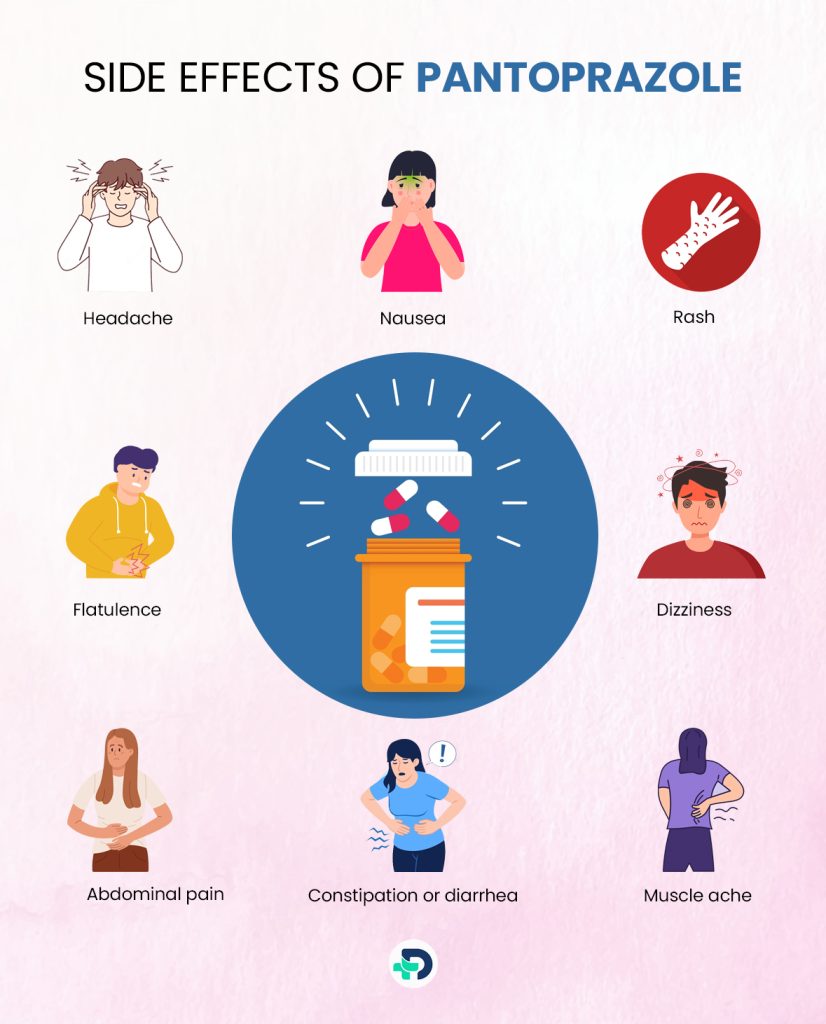Pantoprazole: Uses, Side Effects, and Precautions

- Pantoprazole
- 30 Aug 2023
Introduction
What is Pantoprazole?
A drug called pantoprazole is used to lessen the formation of stomach acid. Treating illnesses like gastric reflux disease, ulcers, and particular kinds of esophageal inflammation is frequently recommended. It belongs to the class of medications called proton pump inhibitors. This article will thoroughly grasp this medication by examining its uses, mode of action, possible adverse effects, and significant factors surrounding it. Additionally, it also aims to provide the information you need to make informed opinions concerning pantoprazole’s function in maintaining digestive health.

Uses
Uses of Pantoprazole
Pantoprazole is used to treat the following conditions –
- Gastroesophageal reflux disease (GERD)
- Peptic ulcers
- Zollinger-Ellison syndrome
- Erosive esophagitis
- Acid related dyspepsia
Disease of Gastroesophageal Reflux
- It aids in alleviating symptoms brought on by stomach acid reflux into the esophagus, such as heartburn, acid regurgitation, and chronic cough.
Peptic ulcers
- Peptic ulcers brought on by high stomach acid and helicobacter pylori infection are treated and prevented using it.
Syndrome Zollinger-Ellison
- This rare disease causes an excess of stomach acid by causing tumors to grow in the pancreas or duodenum. In patients with this illness, it is used to control acid production.
Erosive esophagitis
- Pantoprazole prevents erosive esophagitis, which is frequently present in cases of severe GERD and is caused by damage to the esophagus from stomach acid.
Acid related dyspepsia
- It can be recommended to treat the discomfort brought on by acid-related dyspepsia, a disorder that manifests as bloating, nausea, and stomach pain. 1Uses | Researched based study from Food and Drug Administration
Mode of Action
How does pantoprazole work?
- It reduces the quantity of acid that is produced by your stomach.
- It accomplishes this by preventing acid production by a specific pump found in the cells of your stomach.
- This pump can help treat illnesses, including heartburn, ulcers, and acid-related digestive system problems, by reducing the amount of acid in your stomach.
- This decrease in stomach acid alleviates symptoms and enables your affected stomach and esophagus to heal. 2Mode of Action | Researched based study from National Library of Medicine
Side Effects

Side Effects of Pantoprazole
It may result in side effects, just like any drug. Some people may feel these to a larger or lesser extent than others, and not everyone will. Pantoprazole’s most common side effects include:
Headache
- Some individuals may furthermore develop a mild to moderate headache.
Nausea
- On rare occasions, it can make you feel queasy or sick to your stomach.
Constipation or diarrhea
- Constipation or diarrhea are examples of bowel habit changes that might happen.
- Some people may feel pain or discomfort in their abdomen.
Flatulence
- Bloating or increased gas may be experienced.
Dizziness
- The sense of being lightheaded or dizzy is conceivable but not very prevalent.
Rash
- Rarely, an allergic reaction can cause a skin rash or reach.
Joint or muscle ache
- Only a few persons may experience muscle or joint discomfort.
It is crucial to understand that significant side effects might happen, although uncommon. If you encounter any of the following symptoms, seek emergency medical attention.
- Severe allergic responses, such as difficulty breathing and swelling of the face, lips, tongue, or throat
- Ongoing stomach discomfort
- Unaccounted-for weight loss
- Severe diarrhea with blood or feces that are dark
- Symptoms of low magnesium levels, such as tremors, irregular pulse, and twitching muscles 1Side effects | Researched based study from Food and Drug Administration
Dosage
Dosage instructions
The dosage of pantoprazole can change depending on the condition being treated, its severity, and the unique characteristics of each patient.
For Gastroesophageal reflux disease
Adults: For 4 to 8 weeks, a dose of 40 mg once daily is advised.
Treatment for maintenance: A maintenance dose of 40 mg may be given once day.
For Peptic ulcers
Adults: For 4 to 8 weeks, the typical dosage is 40 mg once daily.
If H Pylori-related ulcers are present, antibiotics may also be used.
Maintenance therapy: To prevent recurrence, a maintenance dose of 40 mg once daily may be advised.
For the Zollinger-Ellison condition
- The initial dose is usually higher, and the amounts are changed according to the needs of each person. 1Side effects | Researched based study from National Institutes of Health
Interactions
Drug Interactions
It may interact with other drugs, which could reduce their efficacy or cause unwanted side effects. The best course of action is to let your doctor know about all of your prescription, over-the-counter, herbal supplement, and vitamin usage.
Warfarin
- It might affect how warfarin, a blood thinner, is metabolized, thus raising the risk of bleeding.
- If you are taking both medications, closely checking your blood clotting time is vital.
Atazanavir
- Atazanavir, an antiretroviral medication used to treat HIV, can absorb less readily.
- It is advised to take it at least 12 hours before or two hours after administering pantoprazole.
Methotrexate
- It may raise the levels of methotrexate, a drug used to treat several ailments, such as cancer and autoimmune illnesses.
- This might result in several methotrexate adverse effects.
Clopidogrel
- Proton pump inhibitors like pantoprazole have the potential to interact with clopidogrel, a medicine used to prevent blood clots, and could lessen clopidogrel’s effectiveness.
Digoxin
- It could boost the amounts of deserts in a drug used to treat particular heart diseases.
- If you take both medications, it is suggested that you regularly check your digoxin levels. 1Drug Interactions | Researched based study from Food and Drug Administration
Certain antifungal medications, and HIV medicines
- It may impact how some antifungal medications, such as itraconazole and ketoconazole, are observed.
Precautions
Precautions and warnings
Intolerance and severe skin reactions
- Its intravenous usage has been linked to anaphylaxis and other severe skin responses such as Erythema Multiforme, Stevens-Johnson syndrome, and Toxic Epidermal Necrolysis (TEN).
Fractured bones
- It may be associated with an increased risk of osteoporotic fractures of the hip, wrist, or spine.
- With daily use of high dosages of pantoprazole, the risk rises. You are more likely to experience a side effect if you already have osteoporosis.
- Ask your doctor to alter the dosage to reduce these occurrences.
Magnesium deficiency (hypomagnesemia)
- Rarely, hypomagnesemia with both symptoms and without symptoms has been reported in individuals taking proton pump inhibitors for at least three months.
- Tetany, arrhythmia, and convulsions are examples of severe adverse responses.
- Treatment for these people typically entails stopping the medication and starting magnesium replacement treatment.
Women who are pregnant and nursing
- If you are pregnant or intend to become pregnant, talk to your doctor about pantoprazole’s potential risks and advantages.1Precautions | Researched based study from Food and Drug Administration
Summary
It is a drug that addresses numerous gastrointestinal disorders and lowers stomach acid production. Comprehending the correct dosage, probable side effects, and interactions is essential. Speak up, seek advice from a medical practitioner, and weigh the long-term benefits and drawbacks of taking the prescription. Although its mechanism is efficient, it must be used responsibly, making it a crucial alternative for managing digestive health.
Any feedback on this article?
 This Articles content was accurate
This Articles content was accurate Very Informative Article
Very Informative Article I have a question or a comment
I have a question or a comment
 This article contains inaccurate content
This article contains inaccurate content This article was not helpful
This article was not helpful I have a question or a comment
I have a question or a comment
We appreciate your helpful feedback!
Checkout our social pages
References
-
Food and Drug Administration
Uses | Side effects | Precautions | Dosage | Interactions
-
National Library of Medicine
Mode of Action





































